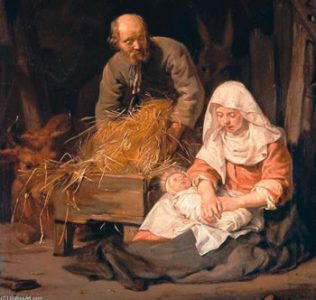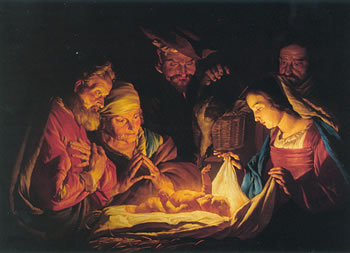The Commonly Good Family
The cultural catch-cry, “put Christ back into Christmas” is a request that falls on the deaf ears of popular culture. People in this hedonistic, media driven culture have long since forsaken the true meaning of Christmas. However it remains a day which is celebrated in the manner of a feast day. Lurking deep within the hearts of those gathered for this cultural celebration is a collective memory of the holiness of the day. If this were not so, non-Christian people would long since have stopped expecting Christmas to be a perfect time. This hidden longing for perfection, masquerading as pleasure seeking, is confirmed annually by stories in the media of peoples’ less than perfect, unhappy, Christmas day experiences.
The cultural catch-cry is not one Catholics should allow to pass their lips for we know that Christ has not left Christmas. Perhaps we sense that the person of Jesus Christ is no longer an active presence in the superficial understanding popular culture has of love. Do we, as lay Catholics, continue to address this impoverished understanding at a seasonal, ‘meet people where they are at’ level, or do we lovingly live year round the hard marriage and family teachings of our religion amongst them? It is a moot point, the mootness of which has been a barrier to the growth of a lay spirituality and our call to be evangelised and to evangelise the hearts of others.
Older Catholics know the story of Christianity is not merely a culture yarn which can have any old spin put on it. Popular culture has yet to produce its own ‘feast days’ and seems hell bent on altering the true meaning of the Christian ones it has inherited. In this endeavour it gets help from within Christianity.
I read this the other day in a letter to the paper, “Within Christianity at least, there’s a growing understanding that all the world’s religions are culturally based metaphor systems, which point to great truths, the power of love and an ultimate reality.” If a Catholic said this the word heresy might spring to mind. Such a belief would make Christmas day merely a human celebration with all the excesses of the day, no expectation of perfection and none of the collective memory of God becoming a person, a memory which lingers throughout the year.
Popular culture has Christianity exactly where it wants it, as a cultural metaphor system for life without an evangelising leg to stand on. Those people who enjoy popular culture for the most part but subconsciously want something a bit holier on Christmas day are left hungry. Try as they might they are never going to be able to remember an “ultimate reality” like they can remember the holy birth of a baby.
Perhaps in our proudly progressive country it is easier to see this spiritual hunger, to feel it on the streets, in the malls, at the Christmas table. People do not want organised religion to feed their hunger. One has only to profess a religious belief in the Annunciation and birth of Christ to experience the humiliation of being understood as belonging to a quaint, outmoded way of living. Yet people in popular culture yearn deeply at times for something their culture cannot give them.
“Put Christ back into Christmas” does not feed this hunger. It smacks of organised Christian ownership of Christ, of an elitist, “we have him you do not,” judgement. If Christians had ears to hear they might catch the strains of popular culture’s retort to their catch-cry. “Put him back yourselves,” is a request that comes up from that collective memory of God as other, as holy, which remains hidden in the hearts of people who do not know how to deal with it when it surfaces.
It is apt that this memory of holiness and its association with perfection comes to light at Christmas and challenges us. What those in popular culture miss on Christmas day is the life of the Trinity, God’s family. Of course popular culture’s collective memory cannot articulate the words that are needed to speak of a love so perfect yet somehow able to be shared by people. “Put him back yourselves” is as near as it can get. Obviously those in popular culture think their Christmas day plight is our fault.
That the Trinity should be remembered in popular culture, no matter how primitively, at a time when families gather is quite frankly a miracle. We who have a special feast day for the Trinity slotted into our highly organised liturgical year perhaps forget at Christmas to remember, in a way that gives perfect love its evangelising legs that Jesus Christ is the son of God. It is the Holy Spirit living in our hearts, offering all those gifts and fruits, who makes our love deeper and visibly happier.
Popular culture is telling us that putting Christ back into Christmas is not so much a cultural challenge for them as a religious crisis rooted in our own back yards, especially those of white, kiwi-middle-class Catholic family life.
A commonly good family is one in which people in popular culture can sense something of the raw life of the Trinity coming into being. When a person who loves popular culture for the most part, (so often our children,) comes into the home of the commonly good family on Christmas day his or her longing for perfection becomes one with the family’s longing. And this family know that perfect presents, perfect food, perfect people are not what the day is about. So in this place and amongst these people there is something else going on that feels like joyful, peaceful, unified fun.
The commonly good family lives out a holy understanding of love which is kept alive throughout the year by a memory of perfect love, a will to pursue that love and a practical and spiritual generosity to live that love. This holy sort of love is attractive to others because in sharing it they sense the common, human longing for perfection being fed by love. And the sense that they get is that this love is somehow both divine and human at the same time. It is a wonder to these popular culturalists that something divine and perfect would want to have a life amongst people whose lives are rather lowly, awfully messy and obviously imperfect. And they go back to their own homes happy and still wondering about the commonly good family life they have experienced.



 Entries(RSS)
Entries(RSS)